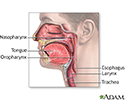Ludwig’s angina
Submandibular space infection; Sublingual space infection
Ludwig's angina is an infection of the floor of the mouth under the tongue. It is due to bacteria.
Causes
Ludwig's angina is a type of skin infection that occurs on the floor of the mouth, under the tongue. It often develops after an infection of the roots of the teeth (such as tooth abscess ) or a mouth injury.
Skin infection
Cellulitis is a common skin infection caused by bacteria. It affects the middle layer of the skin (dermis) and the tissues below. Sometimes, muscle...

Tooth abscess
A tooth abscess is a buildup of infected material (pus) in the center of a tooth. It is an infection caused by bacteria.

This condition is uncommon in children.
Symptoms
The infected area swells quickly. This may block the airway or prevent you from swallowing saliva.
Symptoms include:
- Breathing difficulty
- Difficulty swallowing
- Drooling
- Unusual speech (sounds like the person has a "hot potato" in the mouth)
- Tongue swelling or protrusion of the tongue out of the mouth
- Fever
- Neck pain
- Neck swelling
- Redness of the neck
Other symptoms that may occur with this disease:
- Weakness, fatigue, excess tiredness
- Confusion or other mental changes
-
Earache
Earache
An earache is a sharp, dull, or burning pain in one or both ears. The pain may last a short time or be ongoing. Related conditions include:Otitis m...
 ImageRead Article Now Book Mark Article
ImageRead Article Now Book Mark Article
Exams and Tests
Your health care provider will do an exam of your neck and head to look for redness and swelling of the upper neck, under the chin.
The swelling may reach to the floor of the mouth. Your tongue may be swollen or out of place.
You may need a CT scan .
CT scan
A computed tomography (CT) scan is an imaging method that uses x-rays to create pictures of cross-sections of the body. Related tests include:Abdomin...

A sample of the fluid from the tissue may be sent to the lab to test for bacteria.
Treatment
If the swelling blocks the airway, you need to get emergency medical help right away. A breathing tube may needed to be placed through your mouth or nose and into the lungs to restore breathing. You may need to have surgery called a tracheostomy that creates an opening through the neck into the windpipe.
Tracheostomy
A tracheostomy is a surgical procedure to create an opening through the neck into the trachea (windpipe). A tube is usually placed through this open...

Antibiotics are given to fight the infection. They are most often given through a vein until symptoms go away. Antibiotics taken by mouth may be continued until tests show that the bacteria have gone away.
Dental treatment may be needed for tooth infections that cause Ludwig's angina.
Surgery may be needed to drain fluids that are causing the swelling.
Outlook (Prognosis)
Ludwig's angina can be life-threatening. It can be cured with getting treatment to keep the airways open and taking antibiotic medicine.
Possible Complications
Complications may include:
- Airway blockage
-
Generalized infection (
sepsis
)
Sepsis
Sepsis is an illness in which the body has a severe, inflammatory response to bacteria or other germs.
 ImageRead Article Now Book Mark Article
ImageRead Article Now Book Mark Article -
Septic shock
Septic shock
Septic shock is a serious condition that occurs when a body-wide infection leads to dangerously low blood pressure.
Read Article Now Book Mark Article
When to Contact a Medical Professional
Breathing difficulty is an emergency situation. Go to the emergency room or call your local emergency number (such as 911) right away.
Call your health care provider if you have symptoms of this condition, or if symptoms do not get better after treatment.
Prevention
Visit the dentist for regular checkups.
Treat symptoms of mouth or tooth infection right away.
References
Christian JM, Goddard AC, Gillespie MB. Deep neck and odontotogenic infections. In: Flint PW, Haughey BH, Lund LJ, et al, eds. Cummings Otolaryngology: Head & Neck Surgery . 6th ed. Philadelphia, PA: Elsevier Mosby; 2015:chap 10.
Melio FR, Berge LR. Upper respiratory tract infections. In: Marx JA, Hockberger RS, Walls RM, et al, eds. Rosen's Emergency Medicine: Concepts and Clinical Practice . 8th ed. Philadelphia, PA: Elsevier Mosby; 2013:chap 75.
Review Date: 2/13/2015
Reviewed By: Sumana Jothi MD, otolaryngology-head and neck surgery, airway, voice, and swallowing disorders, clinical instructor UCSF Otolaryngology, NCHCS VA, SFVA, San Francisco, CA. Review provided by VeriMed Healthcare Network. Also reviewed by David Zieve, MD, MHA, Isla Ogilvie, PhD, and the A.D.A.M. Editorial team.

